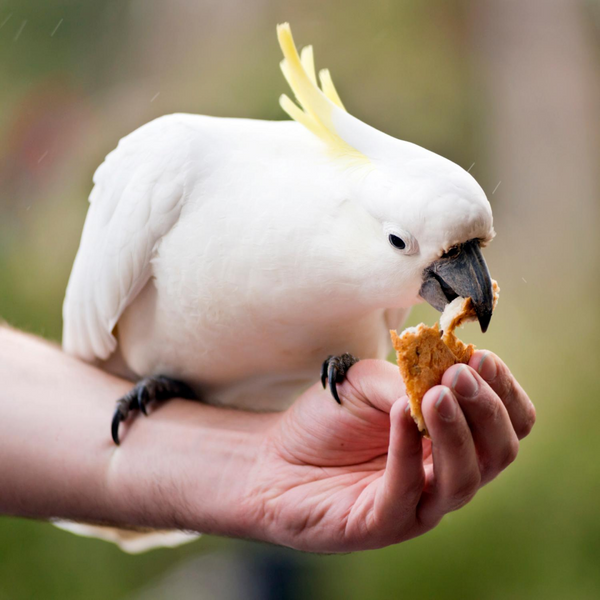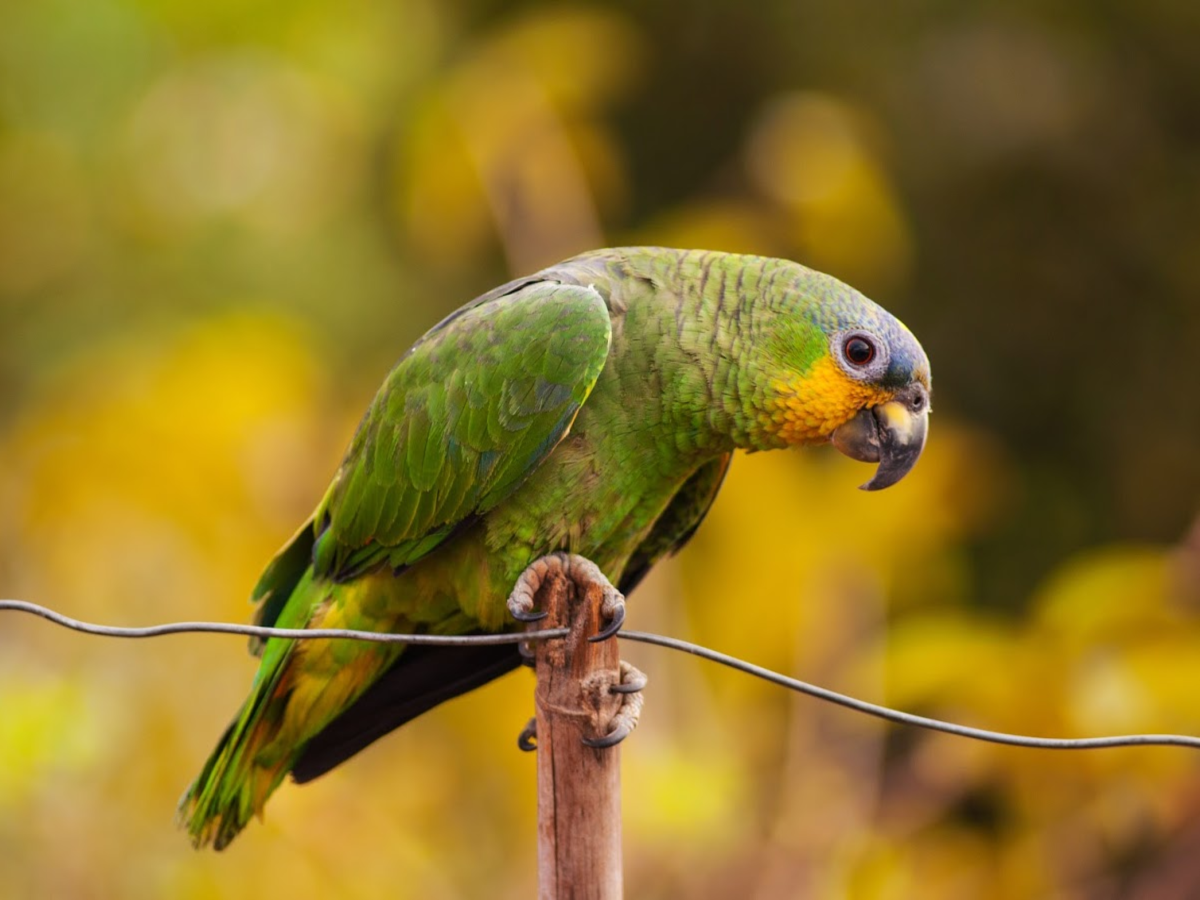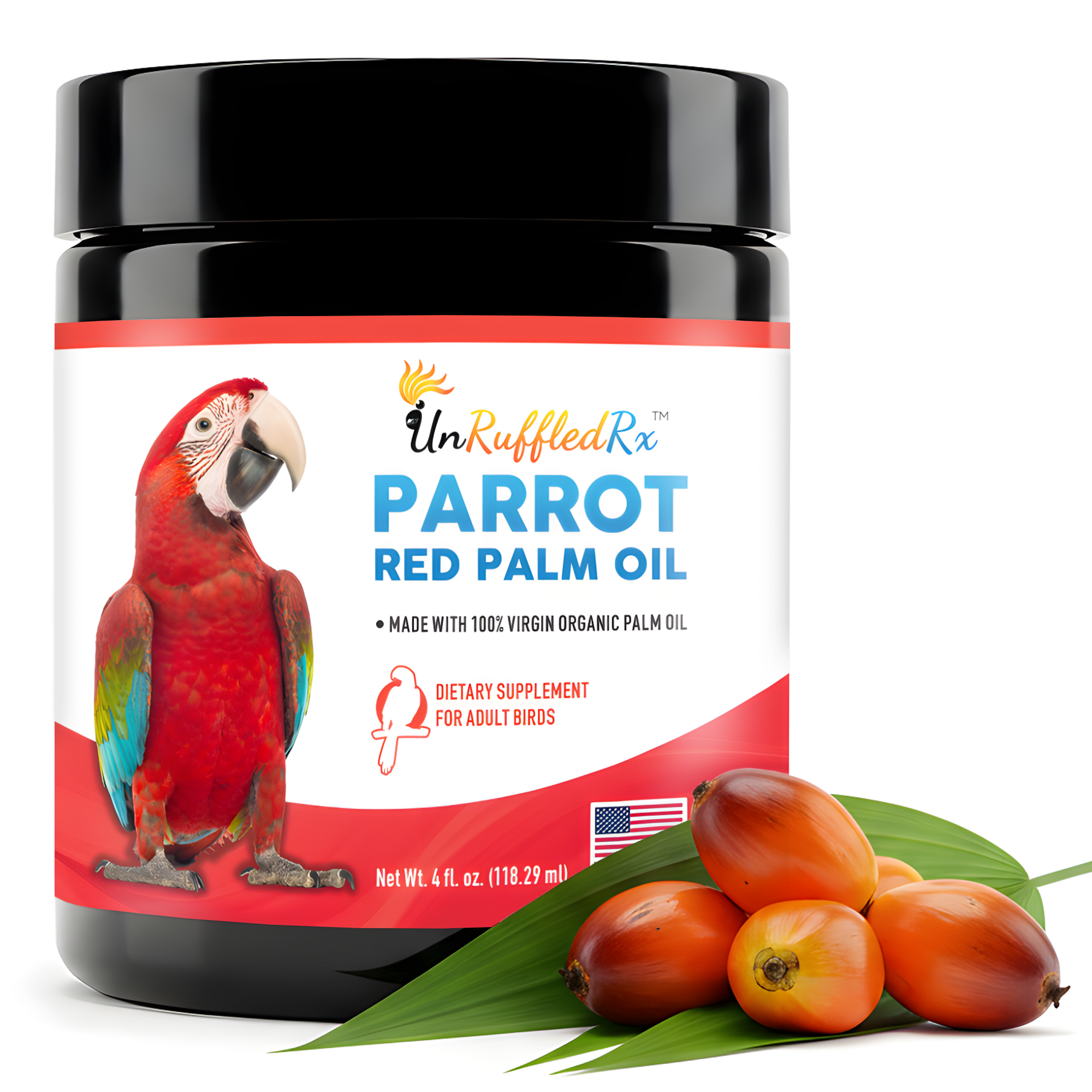Table of Contents
- What Is Considered Middle Age For My Bird?
- Factors That Influence a Parrot’s Life Expectancy
- Common Health Issues That Lead to Feather Plucking in Older Parrots
- A Deeper Look at Inflammation and Feather Plucking
- Important Dietary Needs of Aging Birds
- Reduce Stress and Keep Your Aging Bird Comfortable
Has your older bird started plucking its feathers?
We routinely get calls from worried bird owners who tell us that their older bird started feather plucking seemingly out of the blue
There are many reasons for feather plucking in birds. But, when an older bird that's never plucked before starts this upsetting habit, it can be both upsetting and cause for worry.
In this blog post, I'll share what you need to know about feather plucking in older birds.
Keep reading to learn more.
What Is Considered Middle Age For My Bird?
As a general rule, the larger your bird, the longer its lifespan tends to be.
Let’s take a quick look at the lifespans of various bird species and when they might be expected to reach middle age, baring any major illnesses or injuries according to AAV.org.
|
Species |
Median Lifespan |
Considered Geriatric |
|
African Grey Parrots |
23 years |
> 15 years |
|
Amazon Parrots |
40 - 49 years |
> 25 years |
|
Budgerigars |
7 - 15 years |
> 6 years |
|
Cockatiels |
10 -14 years |
>12 years |
|
Cockatoos |
30 years |
> 20 years |
|
Conures |
30 years |
15 years |
|
Lovebirds |
5 - 15 years |
>10 years |
|
Macaws |
35 - 43 years |
> 30 years |
Keep in mind that these are only estimates. The average life expectancy of a bird depends on several other factors, including genetics, breeding, care and diet. Also, different species start to experience decline in health and day to day functioning at different life stages.
Factors That Influence a Parrot’s Life Expectancy
Several factors affect a parrot’s life expectancy. These include the following:
Hereditary Factors
Your parrot’s genetic makeup can affect its life expectancy. This is why it is important to seek out a reputable breeder. Genetic issues such as heart conditions, cancer, and joint issues can negatively impact your bird’s quality of life and life expectancy.
Diet
Your bird’s diet plays a crucial role in its overall health and well-being. A healthy diet consists of high quality pellets, preferably cold-pressed pellets. Plus, your bird needs a diverse range of raw, uncooked vegetables, low sugar fruits, herbs, sprouts, nuts, and grains for adequate nutritional intake. Raw foods are nutritional powerhouses that offer your feathered friend important nutrients and fiber that it needs to thrive.
The key here is providing a diverse range of plant-based foods.
A poor diet can not only reduce your bird’s lifespan but can also contribute to a host of diseases and organ malfunctioning.
Sleep
A parrot needs at least 10 to 12 hours of sleep per night in a dark, quiet, and safe area. Sleep is crucial for your parrot’s health. Inadequate sleep can put your bird in an unnatural chronic hormonal state and affect the bird’s immune system functioning.
Health
Your parrot’s health history can also affect its lifespan. Regular health checkups can help ensure that your parrot is in good shape. They can also help detect serious health issues early on, when your pet is more amenable to treatment.
Keep in mind that all birds tend to hide illness until they are on the brink of death, as an instinctual strategy. Furthermore, an older bird that may be in pain may refuse to eat. This is why routine checkups are a critical component of parrot husbandry. You'll want to monitor your pet's health each week by taking its weight on a gram scale. If you notice that your bird is starting to loose weight, call your vet and book a checkup.
Cleanliness
All bird's need a clean environment. But, it's especially important for older birds who's immune system may be on the decline.
Make it a point to clean and disinfect your bird’s cage, toys, perches, and food bowls regularly to avoid bacterial and fungal growth. Ensure that your bird always has access to clean, fresh water. Clean all fruits and vegetables before serving them to your feathered friend to remove contaminants and insecticides.
Common Health Issues That Lead to Feather Plucking in Older Parrots
Older birds are susceptible to a number of ailments, that untreated, can affect their quality of life.
Arthritis

Arthritis is a degenerative joint disease that is relatively common in older birds. The feet are commonly affected due to lack of foot exercise, but the disease can affect multiple joints at once, including the back. Arthritis is extremely painful and may cause the affected bird to refuse to eat and move about the cage. The affected joints often get hot or swollen.
Arthritis is progressive and can cause your pet unbearable pain. So much so that many birds resort to feather plucking to find temporary relief. It usually starts out around the affected joints.
If your bird is older or if it's lived in unhealthy conditions in it's past, please ask your vet to perform the necessary tests to uncover if your bird is experiencing joint inflammation. Spring for a thorough physical exam to get baseline data so that you can begin preventative care as soon as possible.
In the case of arthritis, anti-inflammatories and pain medication may be prescribed. Heated perches can help as can over the counter anti-inflammatories such as Pau ‘d Arco, CBD, or hemp seed. Sometimes a topical with gentle analgesic properties, such as Aloe Vera Spray can also help.
Weakened Immune System
Older birds have different dietary requirements as compared to younger birds. If these requirements are not met, they may develop a weakened immune system, making them susceptible to various illnesses and parasites.
Some major bird pellet manufacturers have developed senior parrot diets which are higher in calcium, vitamins, trace minerals, and proteins. Keep in mind, that a balanced diet helps maintain the immune system.
Parasites such as mites can easily cause an infestation and compromise your birds immune system. This can cause your feathered friend to pluck its feathers due to itching and the discomfort. But worse, when parasites suck the blood out of your pet and introduce bacteria, viruses, and other contaminants into your birds system, its a recipe for disaster. Consult with your avian vet for appropriate diagnosis and treatment if you suspect an infestation.
Long-term Dietary Deficiencies
We've already touched on how dietary deficiencies can cause feather plucking in birds, but let's take a deeper dive. Long-term deficiencies, when left unchecked, start having a cumulative effect on your bird’s overall health resulting in organ malfunctioning, skin issues, pain, a shortened life-span, and other ailments.
Excessive feather plucking may be a symptom of a dietary deficiency, another reason to keep up with routine health care visits. Diet can affect both physical comfort and mental stability. Both, huge stressors for your aging parrot.
A good avian veterinarian will conduct an annual full body examination to figure out what’s out of balance.
A bird’s feathers are made up of up to 90% protein. If your bird has been plucking and chewing its feathers, you may want your vet to check and see if it needs more protein or other important nutrients in its diet. Nuts and soaked nuts, seeds, and certain grains are all excellent sources of protein.
Of course, the issue can also arise due to other vitamin and mineral deficiencies.
Allergies
It is not uncommon for older birds to develop allergies to the things in their environment. A bird can develop an allergic reaction to something at any point in its life.
In most cases, they develop allergies to dyes and other preservatives used in pelleted diets, causing the bird to pluck its feathers.
Allergies often cause inflammation and skin discomfort. We'd be remiss if we didn't talk about the importance of vitamin A here. Vitamin A is critical for skin health, and a deficiency can result in some critical skin tissue issues from dry skin to dry eyes, respiratory infections, and poor wound healing. Since plucking out feathers rips out skin tissue, you can easily see the snowball affect of vitamin A deficiency.
Low Humidity
Low humidity in the air can cause your feathered friend’s skin to dry out, yet another cause of feather plucking in birds. If you've ever had extremely dry skin, you'll be able to sympathize. Keep in mind that birds are from humid regions and their skin needs frequent baths.
Frequent misting and bathing can support healthy, supple skin, as can a nutrient rich diet, like the raw food diet described above. Running a full-house or room humidifier can also bring relief. Be care to check the filter on a routine basis as they tend to get moldy.
Organ Malfunction
Organ malfunction and cancer can also increase feather plucking in birds. When ever the bird experiences inflammation of any kind, the discomfort can lead to a plucking disorder. This includes issues like kidney disorders, liver disorder, and other organ failure. As your bird gets older, the risk of organ malfunction increases.
A Deeper Look at Inflammation and Feather Plucking
Feather plucking is rarely associated with just one single cause. Frequently a lot of factors come into play causing the bird so much discomfort that it resorts to feather plucking to deal with the stress. If you notice your bird going downhill, refer to my environmental wellness blog posts that walk you through making important changes to your bird care routines that will support your geriatric bird.
I've already talked about the implications of inflammation in an older birds overall health and disposition. Inflammation can have important and sometimes degenerative whole body effects. The five most common signs of inflammation include:
- Redness
- Swelling
- Heat
- Pain
- Loss of function
In addition to prescription grade medications, you can use natural, over the counter supplements to address it, but be aware that these issues tend to be progressive in nature. Just be sure to carefully watch your pet to determine if over the counter products are offering the much needed relief.
Hemp, CBD, Pau ‘d Arco, coconut oil, and omega-rich red palm are excellent for keeping swelling at bay.
Of course if your bird is experiencing debilitating inflammation, it is critical to follow the doctors advice to the letter. But, for early onset, you might try these home-based supports for preventing or reducing inflammation.
7 Quick at home based methods to reduce minor inflammation in birds:
- Increase the intake of greens. Greens offer anti-inflammatory benefits, with antioxidants other important nutrients.
- Make sure that your pet gets adequate sleep.
- Encourage movement to reduce inflammatory blood markets. Create foraging stations throughout the cage so that your bird has to move to get its dietary intake.
- Spice it up with turmeric rosemary, cinnamon, ginger, and fenugreek.
- Right in the gut. Introducing avian specific probiotics strengthen the gut's microbe barrier to support reduced inflammation.
- Decrease all forms of stress.
- Avoid all food dyes, preservatives, and colors, especially in Eclectus parrots.
Important Dietary Needs of Aging Birds

As i'd mentioned earlier, aging birds have different nutritional needs as compared to younger birds. They’re not as active as a younger bird, and they require different levels of nutrients. Always consult with your avian veterinarian to discuss important dietary changes as your bird ages.
Reduce Calories
As birds start getting older, they need fewer calories. Obesity is a common problem in older birds, which, just like us humans, tends to cause wear and tear on the joints.
Eating too many calories can cause the weight to accumulate, leading to several other lifestyle diseases like obesity, arthritis, fatty liver disease, and heart issues, amongst others
Your vet will help you come up with the recommended daily caloric intake for your aging bird.
- You should start feeding your bird a diet that is rich in fresh produce such as vegetables, fruits, sprouts and more that were described above.
- Feed a high-quality food such as Harrison’s, TOPS, or Roudybush, and if your vet recommends, switch to a senior specific diet.
- A diet rich in Omega - 3 and 6 fatty acids may help slow down degenerative processes.
- Essential fatty acids found in flaxseed oil, walnuts, & almonds may reduce inflammation and have renal protective features.
- Anti-inflammatory and antioxidant rich spices may reduce pain and improve your birds quality of life.
Vitamins and Minerals
While a huge range of fresh, nutrient rich raw foods is important, not all birds will readily eat them. In this case, discuss vitamin and mineral supplements with your vet to avoid deficiencies.
These deficiencies start small but have a cumulative effect on your bird’s health. What may start out causing minimal disruption to daily life can quickly become a huge health issue as your pet ages.
Reduce Stress and Keep Your Aging Bird Comfortable
Stress is one of the biggest reasons behind feather plucking in birds. You should try to make sure your aging bird is comfortable by helping it meet certain physical conditions.
Warmth: Maintain Ideal Temperature
Make sure that the temperature in your house is comfortable for your feathered friend. Sixty-five to seventy five degrees is an ideal temperature range for most parrots but aging and health compromised birds will benefit from heated perches or infrared or thermostatically controlled heat panels.
More Sleep
Your bird needs 10-12 hours of sleep per night. Some older birds will also nap throughout the day. Sleep helps your parrots replenish its body’s resources. It also helps keep the immune system functioning properly.
Cleanliness
Make sure to keep your parrot’s cage clean to keep harmful fungal and bacterial growth at bay. You should deep clean the cage at least weekly for the best results.
Toys and Interaction
Keep your bird mentally occupied by providing it with ample mental stimulation. While your older bird may not be an avid climber or chew anymore, it does enjoy being preoccupied with foraging activities and natural toys. You can give your bird some toys like foraging toys to play with and make sure it gets as much enrichment as possible.
All in All: Can Feather Plucking Be Turned Around?
Plucking is a learned behavior that can quickly turn into a habit.
However, it can be turned around if you address the contributing factors as soon as possible, before a habit ensues. In many cases, feather plucking in old birds is caused by pain and inflammation so work closely with your avian veterinarian to minimize discomfort and improve your pets day to day quality of life.
Even an older pet can still enjoy a rich, pain-free life with routine checkups and a few accommodations on your part. With proper care, you can enjoy your aging pet for years to come.
To support your aging bird, check out our Senior Bird Care Collection for specialized diets, supplements, and accessories to enhance their comfort and well-being.
Related Posts:
5 Tips To Help Your Bird In Its Golden Years
What is Bird Arthritis and How Does It Affect Birds
How to Tell If Your Bird Is In Pain and What To Do About It
Diane Burroughs, LCSW is a licensed psychotherapist trained in ABA therapy techniques. She specializes in avian anxiety disorders and is certified in Nutrition For Mental Health. Diane has written a number of bird behavior books and she offers behavior consultations. She's developed a range of UnRuffledRx Science-backed Parrot Wellness Supplies.
Diane's products have been featured in the Journal of Avian Medicine and Surgery and at Exoticscon, a conference for exotic pet veterinarians. Her bird collars & supplements are stocked in avian vet clinics and bird stores throughout the US. With over 30 years in the field of behavior, Diane has created thousands of successful individualized behavior plans that help pets thrive.
TAGS: #SeniorBird #AgingBirdChart
SHARING IS CARING! PLEASE SHARE ON YOUR FAVORITE SOCIAL MEDIA NOW!














